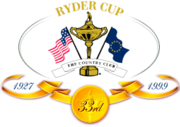 | |||||
| Dates | September 24–26, 1999 | ||||
|---|---|---|---|---|---|
| Venue | The Country Club, Championship Course | ||||
| Location | Brookline, Massachusetts | ||||
| Captains |
| ||||
| |||||
| United States won the Ryder Cup | |||||
The 33rd Ryder Cup, also known as the "Battle of Brookline",[1] was held September 24–26, 1999, in the United States at The Country Club in Brookline, Massachusetts, a suburb southwest of Boston.
The American team won the competition by a margin of 141⁄2 to 131⁄2, The Europeans, leading 10–6 heading into the final round, needed only 4 points on the final day to retain the cup. The Americans rallied on the Sunday, winning the first 6 matches of the day to surge into the lead. Further wins by Steve Pate and Jim Furyk took them into a 14–12 lead. The Americans recaptured the Ryder Cup when Justin Leonard halved his match with José María Olazábal. With the match all-square Leonard holed a 45-foot birdie putt on the 17th hole. After controversial premature celebrations on the green, Olazabal then missed his 22-foot birdie putt to leave Leonard one up with just one hole to play, assuring him of a half point and guaranteeing an American victory.
The behavior of both U.S. spectators and the U.S. team was criticized by both American and European media. U.S. spectators raucously heckled and abused European players. Allegations were also made regarding cheating on the part of course marshals. Notoriously, the U.S. team raucously invaded the 17th green after Leonard had holed his long putt but before Olazábal had attempted his shorter putt. The incident was viewed by many in both the US and Europe as appalling sportsmanship.[2][3][4][5][6] Veteran broadcaster Alistair Cooke described the last day of the tournament as "a date that will live in infamy" in a Letter from America entitled "The arrival of the golf hooligan".[7]
At the time, the American win was the largest final day come-from-behind victory in Ryder Cup history; Europe achieved the same feat in 2012. It is still widely regarded as one of the most impressive come-from-behind victories in recent sports history.[8]
This was one of the last public appearances of Payne Stewart, who died in a plane crash less than a month later.
- ^ "Europe fired up for Ryder defence". BBC News. September 15, 2008. Retrieved April 21, 2010.
- ^ Rosaforte, Tim; Hawkins, John (September 11, 2010). "Inside Golf's Greatest Comeback". Golf Digest.
- ^ Davies, David (September 16, 2004). "Day of shame that refuses to die". The Guardian.
- ^ Campbell, Paul (October 1, 2012). "From the Vault: Europe capitulate in Brookline in Ryder Cup 1999". The Guardian.
- ^ "Lehman named US Ryder Cup captain". BBC Sport. November 3, 2004.
- ^ Davies, David (November 18, 2004). "Casey opens war with America". The Guardian.
- ^ Cooke, Alistair (October 4, 1999). "The arrival of the golf hooligan". BBC News. Retrieved October 2, 2010.
- ^ Shipnuck, Alan (October 4, 1999). "Ryder Cup 1999: Smokin'". Sports Illustrated. Archived from the original on September 15, 2008. Retrieved September 21, 2008.

